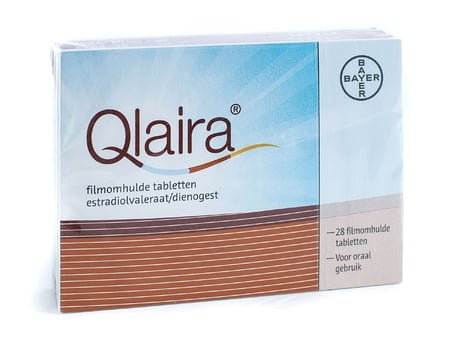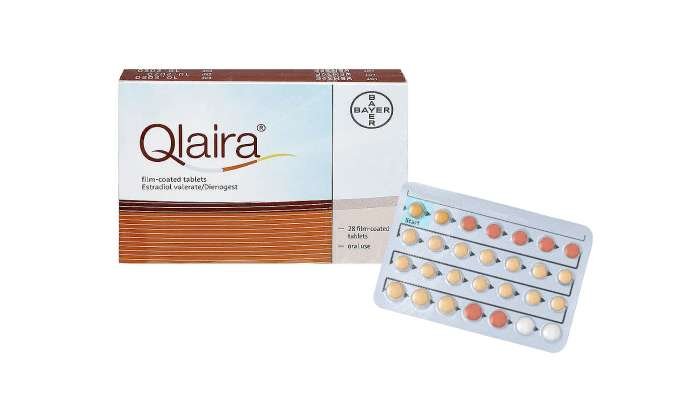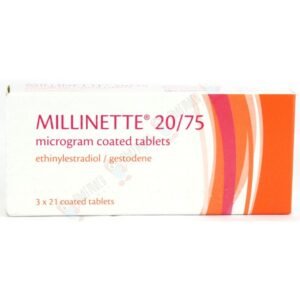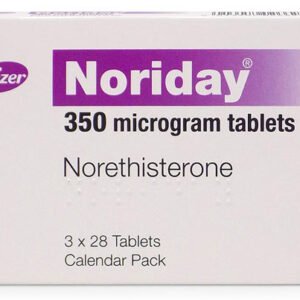What is Qlaira?
Qlaira is a birth control pill that contains two female hormones, a progestogen called Dienogest and a natural estrogen called Estradiol Valerate, in different concentrations. This medicine has the characteristics that it offers the user a more regular menstrual cycle, providing less painful menstruation and lighter bleeding. In addition, Qlaira comes in a package of 28 pills.
Qlaira is a contraceptive more similar to a woman’s menstrual cycle, and the color of each pill indicates the different concentrations of progestogen, estrogen, or both. The 26 colored pills contain hormones and the 2 white pills contain no hormones.
- The dark yellow pills contain 3mg of estradiol valerate.
- The intermediate red pills contain 2mg of estradiol valerate and 2mg of dienogest.
- The light yellow pills contain 2mg of estradiol valerate and 3mg of dienogest.
- The dark red pills contain 1mg of estradiol valerate.
- White pills do not contain hormones.
How does it work?
What are the benefits of taking it?
How do I use it and its dosage?
Side effects & precautions
Like all medicines, this medicine can cause side effects, although not all people suffer from them.
The following side effects have been related to the use of Qlaira:
Common side effects: may affect up to 1 in 10 people
- headache
- abdominal pain, nausea
- acne
- absence of periods, breast discomfort, painful periods, irregular bleeding (irregular and heavy bleeding)
- weight gain
Uncommon side effects: may affect up to 1 in 100 people
- yeast infections, yeast infection of the vulva and vagina, vaginal infection
- increased appetite
- depression, depressive mood, emotional disorders, sleep disorder, lack of sex drive, mental disorder, mood swings
- dizziness, migraine
- hot flashes, high blood pressure
- diarrhea, vomiting
- increased liver enzymes
- hair loss, excessive sweating (hyperhidrosis), itching and a rash
- muscle cramps
- enlargement of the breasts, lumps in the breasts, abnormal growth of cells on the cervix (cervical dysplasia), uterine genital bleeding, painful sexual intercourse
- fibrocystic breast disease, heavy menses, disorders
- periods, ovarian cyst, pelvic pain, premenstrual syndrome, growth in the uterus, uterine contractions, uterine/vaginal bleeding incl. spotting, vaginal discharge, vulvovaginal dryness
- fatigue, irritability, inflammation of parts of the body, eg the ankles (edema)
- weight loss, changes in blood pressure
Rare side effects: may affect up to 1 in 1,000 people
- candida infection, oral herpes, pelvic inflammatory disease, vascular disease of the eye that looks like a fungal infection (suspected histoplasmosis syndrome eye), fungal skin infection (tinea versicolor), urinary tract infection
- inflammation by bacteria in the vagina
- fluid retention, increase in some fats in the blood (triglycerides)
- aggression, anxiety, a feeling of unhappiness, increased interest in sex, nervousness,
- nightmares, restlessness, sleep disorders, stress
- decreased attention, pins and needles, vertigo
- intolerance to contact lenses, dry eyes, eye swelling
- heart attack (myocardial infarction), palpitations
- bleeding from varicose veins, blood clot in a vein (venous thromboembolism),
- low blood pressure, inflammation of superficial veins, painful veins
- constipation, dry mouth, indigestion, heartburn
- nodules in the liver (focal nodular hyperplasia), chronic inflammation of the gallbladder
- allergic skin reactions, golden brown spots (chloasma) and other disorders
- pigmentation, male-patterned hair growth, excessive growth of the hair, skin conditions such as dermatitis and neurodermatitis, dandruff and oily skin (seborrhea) and other skin disorders
- back pain, jaw pain, feeling of heaviness
- pain in the urinary tract
- abnormal withdrawal bleeding benign breast nodules, stage breast cancer
- early, cysts in the breast, discharge from the breast, polyp in the cervix,
- redness of the cervix, bleeding during intercourse, discharge
- spontaneous milk, genital discharge, less abundant menses, delayed menses, rupture of an ovarian cyst, vaginal odor, burning sensation in the vulva and vagina, vulvovaginal discomfort
- inflammation of lymph nodes
- asthma, shortness of breath, nosebleeds
- chest pain, tiredness and a general feeling of being unwell, fever
- abnormal cervical smear







Reviews
There are no reviews yet.